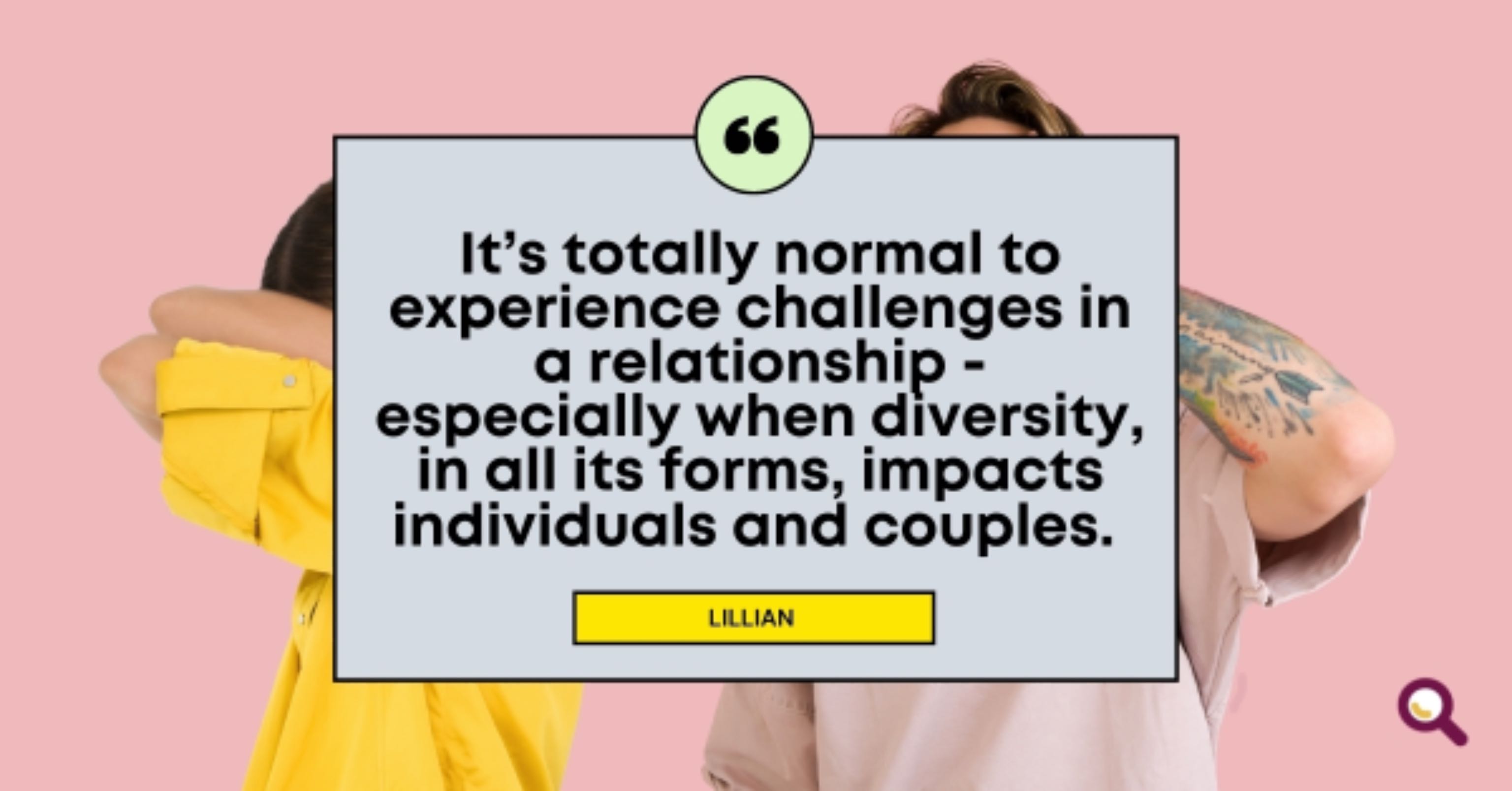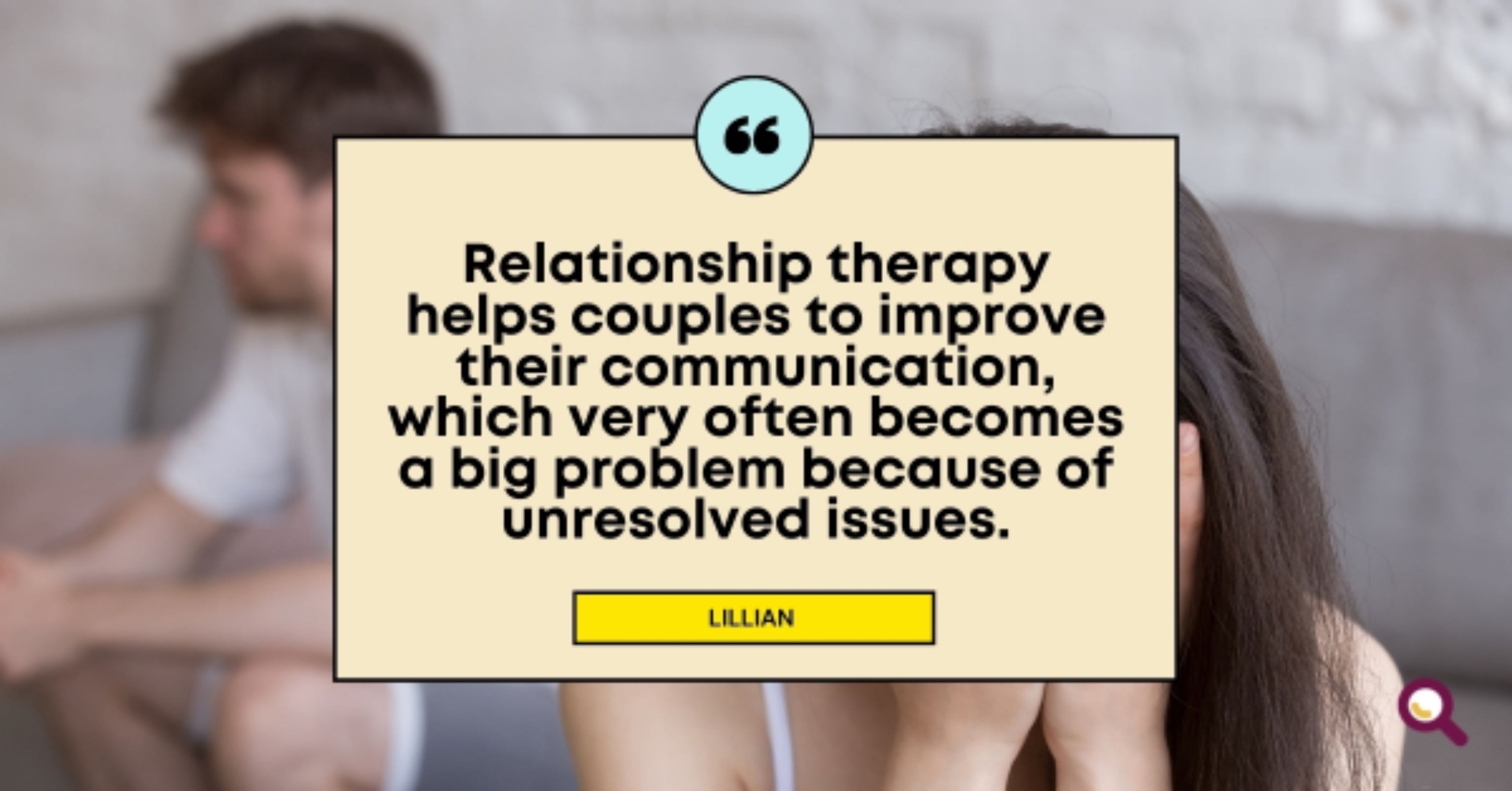Reviewed By Pamela Kirkpatrick - Senior Accredited NCS & Registered Member MBACP Adv. Dip.
What Does Relationship Therapy Involve?
31 March 2021
Relationship therapy can help you & your partner work through difficult issues. Here’s what to expect in couple’s therapy.
Lillian is an accredited Relationship Counsellor, with a Higher Diploma in Marriage and Relationship Counselling and Therapy.
Relationship Therapy (or relationship counselling) is a space where couples can work through issues affecting their relationship. The current covid-19 situation and its lockdowns, have had a huge impact on relationships, especially those already fragile or fraught with difficulties. Please know that help is available, and most of all, needing help is normal. Even without instances like covid-19, it’s totally normal to experience challenges in a relationship – especially when diversity, in all its forms, impacts individuals and couples.
What does Relationship Therapy involve?
Relationship therapy/counselling provides a warm and secure environment where couples and individuals can feel safe to explore issues impacting on their relationships in a confidential manner without fear of judgement. It enables you to explore your issues, how they arose and begin the process of gaining insight into your relationship and resolve conflict, enabling you both to negotiate a way forward.
How do I know if my relationship needs therapy?
There are many complex and diverse issues that cause conflict in relationships and below are some of the most common:
-Communication
-Arguments
-Affairs
-Intimacy
-Finance
-Physical/Mental Health
-Domestic Abuse
-Separation/Divorce
-Co-parenting
-Step/Blended Families

How many sessions of Relationship Therapy can I expect?
Each relationship is unique and sessions are tailored to meet the needs of individuals and couples. It is normal for sessions to last between 6 and 12 weeks, but for some this can take longer depending on the complexity of the issues.
What can I expect in a Relationship Therapy session?
The counsellor will facilitate couples in identifying issues in the relationship and then explore how and when these issues arise. You will develop new skills to help resolve issues, including improving communication, building trust and conflict resolution. This process is not about blame or shame, but it’s about strengthening the relationship by using new skills outside the counselling room.
The therapy/counselling helps couples to improve their communication, which very often becomes a big problem because of unresolved issues. Improving communication helps the couple to hear and respect one another’s perspectives, and doing so enables them to get to the root of the problem. From there, the therapist/counsellor will help navigate a way forward.

Is Relationship Therapy just for couples? Or can you have Relationship Therapy for other relationships, like friends or family?
Although relationship therapy/counselling is usually for couples, individuals can also use this if a partner doesn’t wish to attend. Family issues do arise in relationship counselling in the context of how these issues impact a couple’s relationship. For family relationship therapy/counselling, Family Therapists are specialised in providing counselling and support, where family members can attend sessions together.
It is unusual for friends to attend relationship counselling, but if friendships are impacting on relationships, this can be explored in your sessions. Individual counselling can explore managing relationships, including friendships.
What are the benefits of Relationship Therapy?
Benefits include:
-Improved communication
-Resolved identity issues
-Deepened connection and intimacy
-Renegotiated commitments
-Developed decision-making
I want to try relationship therapy, but I don’t know how to tell my partner or to ask them to join. What do you suggest I do and how do I go about it?
If you are seeking relationship counselling, you are probably already feeling frustrated with the relationship or partner, so timing is very important. Try to introduce the subject when you are in a place of calm, which usually allows you to listen to each other.
If it’s done during an argument, people can feel blamed and become defensive. When you’re discussing therapy, highlight how much you value the positives in the relationship and how you want it to be better. Allow yourself to be a little vulnerable and let him/her know your fears for the relationship if you cannot resolve issues on your own.
Get Inspired Further
the importance of healthy relationships
Stephen Maginn shares his thoughts and advice on how and why it is important that we look after ourselves and our relationships, especially given the added pressure at this time of year. He shares some fabulous services & online resources that can help get your relationship back on track.
what is play therapy
Play Therapy is a form of therapy which uses 'play' as a means of self-expression.
emotionally connect couple
How to deepen your relationship and emotionally connect with your partner, including practical tips.



